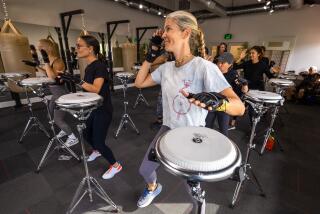The Beat of Culture : Heritage: A Ghanaian drummer’s shop reconnects black Americans to their roots.
- Share via
CRENSHAW — Ghanaian drummer Kwashi Amevuvor remembered a strange feeling coming over him while teaching an African culture class in Cologne, Germany, 14 years ago.
“I felt sick, like I was giving away our people’s history,” Amevuvor said. “That’s when I knew I had to bring the education back home. It is time for this generation to know the truth about Africa.”
Last month, Amevuvor opened Adonu International Music Center, a drum and African instrument shop in the Crenshaw District that also serves as a cultural center for black Americans, who he thinks are woefully disconnected from their roots. Amevuvor gives lessons in what he deems the single most important form of communication in the history of the African diaspora: the drum.
“The drum is a language,” said Amevuvor, a 40ish man who typically dresses in the richly colored kente garb of West Africa. “It carried messages from village to village. For centuries, it has been radio and TV between peoples of different languages and cultures all over the continent.”
Nearly every inch of Adonu’s walls are hung with drums and other percussive instruments, and taller instruments are arranged on the floor. Amevuvor mentioned the different names and functions of drums from throughout Africa, including Ghana, Nigeria and Kenya. Among the drums were donno (talking drum), sogo (used exclusively by the Ewe tribe of Ghana to aid in freeing slaves), and drums used for ceremonies such as blessing a harvest or greeting a king.
“The African tradition is oral, so this rap music is nothing new,” Amevuvor said. “You cannot write it down. It’s spontaneous language, with different rhythms every second. The old stuff has come back.”
Amevuvor, whose nickname, Kwashi, loosely translates into “master drummer,” has taught African studies and music since 1970 at colleges and schools in 54 countries. He has also performed with a variety of African musical groups; his current one is called Sankofa.
Amevuvor, who settled in Los Angeles as a free-lance music teacher 11 years ago, said he was strolling through the African Marketplace in the Crenshaw area last summer when he came upon a man selling drums.
“When I told him his drums were out of tune, he didn’t even know what I meant,” said Amevuvor. “He knew nothing about the drums. I got very angry--he was just selling for a profit, not caring about the history.”
The man, Dan Rice, persuaded him to tune a few drums for a fee; Amevuvor stayed and sold several that day. The men formed a partnership that wed Rice’s goods and financial backing with Amevuvor’s know-how, and the store was born. Amevuvor decided to call it Adonu, his formal first name.
Amevuvor said he was quick to suggest the location on Santa Rosalia Drive in the Crenshaw District. “It could have been Melrose or Beverly Hills, but I was interested in teaching culture where it’s needed,” he said.
He said cultural awareness is needed in the African-American community, which he says suffers from such internal problems as gangs because “black people are not cleaning house.”
“We must invest in ourselves,” he said. “Learning the drum, like ballet, is learning discipline, respect, how to listen. We need that.”
Amevuvor is at the store every day, often rehearsing his band after hours. “My own two drums are my wives,” he said. “I like to be around them. They talk to you. Break them, and you kill me.”
More to Read
The biggest entertainment stories
Get our big stories about Hollywood, film, television, music, arts, culture and more right in your inbox as soon as they publish.
You may occasionally receive promotional content from the Los Angeles Times.










